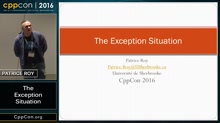Visual Studio extensions for C++ developers in Visual Studio 2017--Adam Welch
Several Visual Studio extensions that can make your life better as a C++ developer:
Visual Studio extensions for C++ developers in Visual Studio 2017
by Adam Welch
From the article:
In this blogpost we want to highlight several Visual Studio extensions that can make your life better as a C++ developer if you’re using Visual Studio 2017 or considering upgrading...

 Have you registered for CppCon 2017 in September?
Have you registered for CppCon 2017 in September?